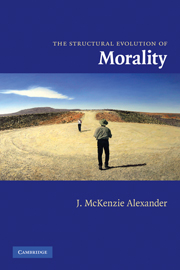The Structural Evolution of Morality
It is certainly the case that morality governs the interactions that take place between individuals. But what if morality exists because of these interactions? This book, first published in 2007, argues for the claim that much of the behaviour we view as 'moral' exists because acting in that way benefits each of us to the greatest extent possible, given the socially structured nature of society. Drawing upon aspects of evolutionary game theory, the theory of bounded rationality, and computational models of social networks, it shows both how moral behaviour can emerge in socially structured environments, and how it can persist even when it is not typically viewed as 'rational' from a traditional economic perspective. This book also provides a theory of how moral principles and the moral sentiments play an indispensable role in effective choice, acting as 'fast and frugal heuristics' in social decision contexts.
- An introduction to the use of evolutionary game theory in philosophy and the social sciences
- Uses computer simulations to model social decision problems
- Illustrated with over 150 figures to summarise results
Reviews & endorsements
Review of the hardback: 'This is an important book for philosophers as well as social scientists. It clearly models how pro-social behavior can emerge in social networks, and shows which network structures are most conducive to the development of co-operation, trust or fairness. The book advances our understanding of evolutionary games, since it makes them more realistic and applicable to the complex social structures we live in.' Cristina Bicchieri, University of Pennsylvania
Review of the hardback: '… this work is certain to be invaluable to anyone following the road laid by Brian Skyrms. Additionally, I recommend this book to many of those unconvinced about the possibility of making the leap from an explanation of thin morality to a thick account. … this work makes an important contribution to political philosophy and to the social sciences more broadly.' Church History
Product details
August 2010Paperback
9780521152693
312 pages
229 × 152 × 18 mm
0.46kg
Available
Table of Contents
- Preface
- Acknowledgements
- 1. Introduction
- 2. Types of evolutionary models
- 3. Cooperation
- 4. Trust
- 5. Fairness
- 6. Retribution
- 7. Multiplayer games
- 8. Philosophical reflections
- Select bibliography
- References
- Index.







